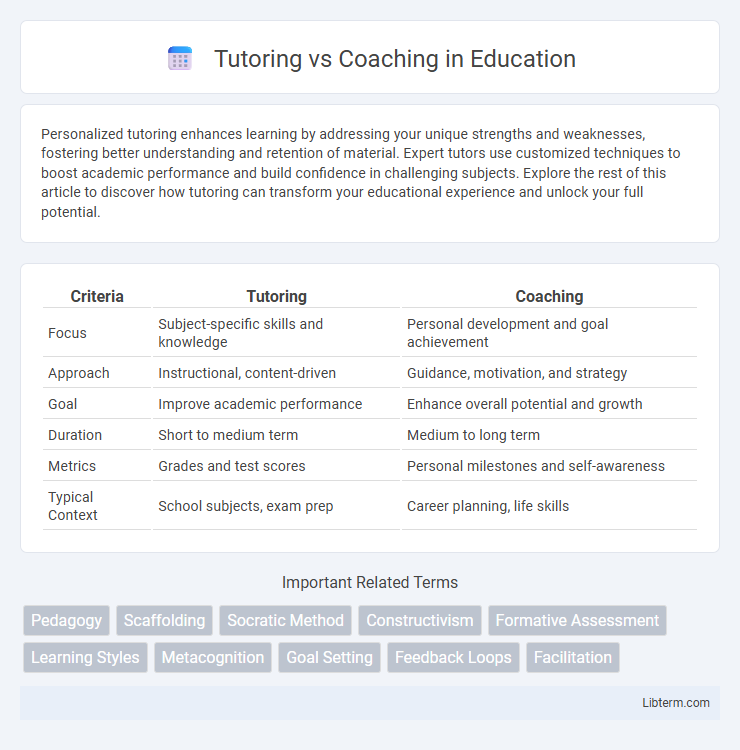Personalized tutoring enhances learning by addressing your unique strengths and weaknesses, fostering better understanding and retention of material. Expert tutors use customized techniques to boost academic performance and build confidence in challenging subjects. Explore the rest of this article to discover how tutoring can transform your educational experience and unlock your full potential.
Table of Comparison
| Criteria | Tutoring | Coaching |
|---|---|---|
| Focus | Subject-specific skills and knowledge | Personal development and goal achievement |
| Approach | Instructional, content-driven | Guidance, motivation, and strategy |
| Goal | Improve academic performance | Enhance overall potential and growth |
| Duration | Short to medium term | Medium to long term |
| Metrics | Grades and test scores | Personal milestones and self-awareness |
| Typical Context | School subjects, exam prep | Career planning, life skills |
Understanding Tutoring vs Coaching
Tutoring involves personalized academic assistance aimed at improving specific subject knowledge and skills, often focusing on homework help, exam preparation, and concept clarification. Coaching emphasizes broader skill development, including goal setting, motivation, and personal growth, often applied to professional or athletic contexts. Understanding the distinction helps individuals choose tutoring for targeted learning support and coaching for comprehensive performance enhancement.
Core Objectives: Tutoring Compared to Coaching
Tutoring primarily focuses on enhancing subject-specific knowledge and academic skills, helping students grasp concepts, complete assignments, and improve grades. Coaching centers on developing broader personal and professional skills such as goal-setting, motivation, and performance improvement. While tutoring targets immediate educational needs, coaching aims at long-term growth and self-improvement.
Roles and Responsibilities of Tutors and Coaches
Tutors primarily focus on enhancing academic skills by providing personalized instruction, clarifying subject material, and helping students achieve specific learning goals. Coaches concentrate on developing broader competencies such as motivation, goal-setting, time management, and performance improvement, often addressing mental and emotional barriers. While tutors address content mastery, coaches work on mindset and strategy to optimize overall growth and success.
Methods and Techniques: Tutoring vs Coaching
Tutoring primarily employs personalized instruction techniques focused on subject mastery, using methods like direct teaching, practice exercises, and feedback to address specific academic challenges. Coaching emphasizes motivational strategies and goal-setting techniques, employing active listening, questioning, and reflective dialogue to enhance personal development and performance skills. Both methods utilize assessment tools, but tutoring centers on knowledge acquisition while coaching prioritizes behavioral change and skill application.
Target Audience: Who Benefits?
Tutoring primarily benefits students seeking academic support, personalized guidance, and skill reinforcement in specific subjects to improve grades and comprehension. Coaching targets individuals aiming for personal or professional development, including career growth, leadership skills, and goal achievement. Both approaches serve distinct audiences, with tutoring focused on learners needing concrete knowledge enhancement and coaching tailored to clients seeking strategic growth and motivation.
Measuring Success: Outcomes in Tutoring and Coaching
Measuring success in tutoring often centers on improved academic performance, test scores, and mastery of specific subjects, using quantifiable metrics such as grades and exam results. Coaching success is evaluated through personal development indicators like enhanced leadership skills, goal achievement, and behavioral changes, which are assessed via performance reviews and self-assessments. Both tutoring and coaching outcomes rely on tailored feedback and progress tracking to ensure effective skill acquisition and growth.
Skills Development: Academic vs Personal Growth
Tutoring primarily targets academic skills development by enhancing subject knowledge, problem-solving abilities, and exam preparation strategies. Coaching emphasizes personal growth, fostering skills like time management, confidence building, goal setting, and emotional intelligence. Both approaches play complementary roles, with tutoring focusing on cognitive skill mastery and coaching nurturing overall behavioral and motivational development.
When to Choose Tutoring Over Coaching
Choose tutoring over coaching when a student requires personalized academic support to master specific subjects, improve grades, or prepare for exams. Tutoring is optimal for targeted skill development, reinforcing classroom learning, and addressing immediate knowledge gaps. Opt for tutoring when measurable academic improvement is the primary goal rather than broader personal or professional growth.
Integrating Tutoring and Coaching for Maximum Impact
Integrating tutoring and coaching combines personalized academic support with goal-oriented mindset development, enhancing student outcomes through tailored strategies that address both knowledge gaps and motivation. This holistic approach leverages tutoring's subject expertise and coaching's emphasis on self-regulation, time management, and confidence-building to foster sustained academic growth. Research shows students receiving integrated support demonstrate higher engagement, improved problem-solving skills, and greater resilience in learning environments.
Future Trends in Tutoring and Coaching
Emerging technologies like AI-powered personalized learning platforms are transforming tutoring by enabling customized lesson plans that adapt in real-time to student progress, enhancing learning efficiency. Coaching is increasingly integrating behavioral analytics and virtual reality simulations to provide immersive, data-driven development experiences tailored to individual strengths and goals. The future of tutoring and coaching will emphasize hybrid models combining digital tools with human expertise to maximize engagement and measurable outcomes across academic and professional growth sectors.
Tutoring Infographic

 libterm.com
libterm.com